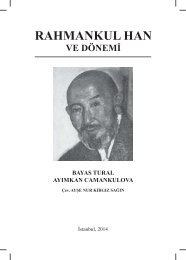THE SOVIET HISTORIOGRAPHY AND THE QUESTION OF KAZAKHSTAN’S HISTORY
SOVYET-TARIH-YAZICILIGI-ENG
SOVYET-TARIH-YAZICILIGI-ENG
You also want an ePaper? Increase the reach of your titles
YUMPU automatically turns print PDFs into web optimized ePapers that Google loves.
<strong>THE</strong> <strong>QUESTION</strong> <strong>OF</strong> <strong>KAZAKHSTAN’S</strong> <strong>HISTORY</strong> 149<br />
and today’s political history. It is impossible to separate history from<br />
this policy. It cannot be other thoughts of history.” 248<br />
Stalin’s strengthening of position of state control after the 1930’s<br />
the changes in researching and writing history is visible. Under the<br />
pressure of Communist leaders historians started writing history that<br />
will consolidate the Soviet brotherhood. In these works the participation<br />
of nations, living under Soviet Union, to Russia was showed not<br />
as occupation, but as completely voluntarily, and at the same time it<br />
is emphasized that these participations provided the support to the<br />
people that were occupied. Also it is highlighted the big brother role<br />
of Russians over other nations. 249<br />
Also in the period after Stalin the Communist Party continued to<br />
expect historians’ works that’ll consolidate nations’ union under the<br />
Soviet pot. The 23rd Communist Party Congress that took place in<br />
1966, Party gave to historians tasks as follows: “Party is expecting from<br />
scientists and historians to stick together with communisms needs to<br />
provide high level morality to the people and to solve the problems of<br />
society.” 250 As it is understood historians were carrying very important<br />
mission of ideological struggle.<br />
The Communist Party’s expectations from historians can be summarized<br />
as follows: To increase the friendship of different nations that<br />
are living under Soviet Union which has a multinational structure, for<br />
strengthening the nations’ bonds to Soviet government to forefront the<br />
Soviet patriotism. As it is understood, from that point of view not only<br />
Soviet period but also the Tsardom period should be rewritten, too.<br />
The implementation field of this new history thesis, that is supporting<br />
soviet ideology, became a new curriculum of formal educational<br />
institutions. The artificial minds, made according to Communist<br />
Party’s directives, without doubt would be quite effective in rising<br />
of young generations that will meet the expectations of Communist<br />
Party. In making a new mind of society as much as historians’ the<br />
history teachers’ role was very important, the guidebook that supports<br />
curriculum of history class was explained this way: “The materials of<br />
history class should be run in a way of increasing a love to Lenin, to<br />
Communist Party and to students’ socialist homeland. Furthermore, the<br />
patriotism, the proletariat and internationalist thoughts of students<br />
248 Ağayev, E. “Sovyet İdeolojisi Çerçevesinde Türk Cumhuriyetlerinin Tarih Yazımı ve Tarih<br />
Eğitimi: Azerbaycan Örneği”, (Yayınlanmamış Doktora Tezi), 2006, p. 84.<br />
249 Tillet, L. R., The Great Friendship Soviet Historians on the Non-Russian Nationalities, N.<br />
Carolina, 1969, pp. 16-17.<br />
250 “Bolşiya Zadaçi”, Voprosı İstorii, 1966, No: 6, p. 8.



